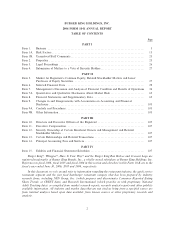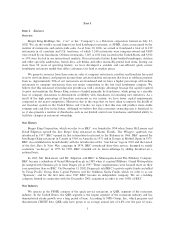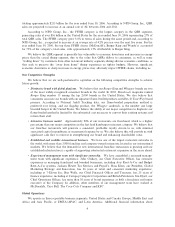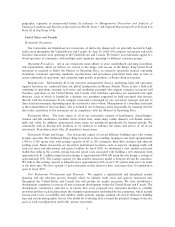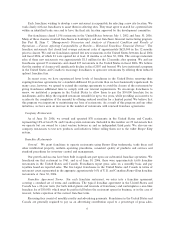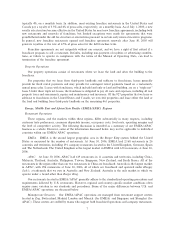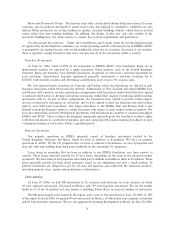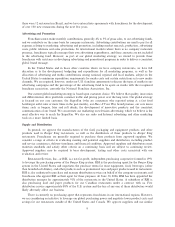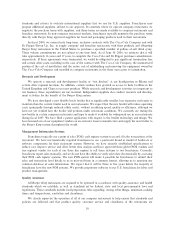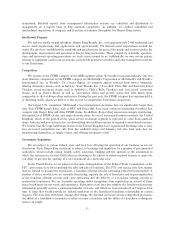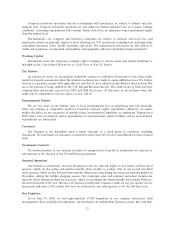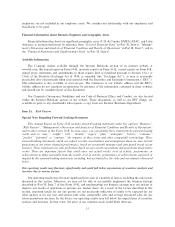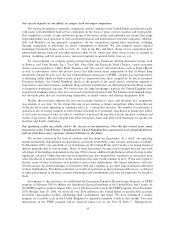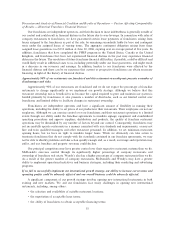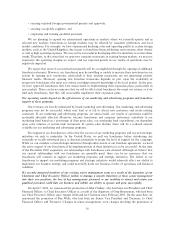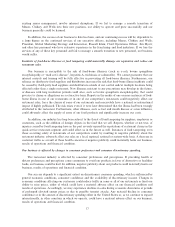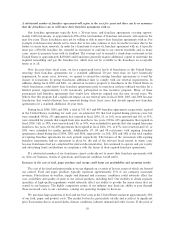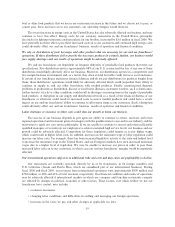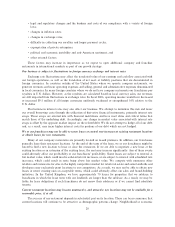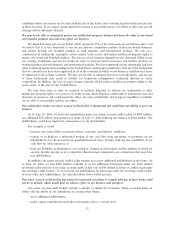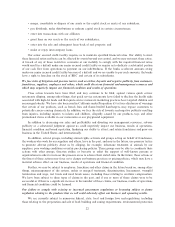Burger King 2006 Annual Report Download - page 24
Download and view the complete annual report
Please find page 24 of the 2006 Burger King annual report below. You can navigate through the pages in the report by either clicking on the pages listed below, or by using the keyword search tool below to find specific information within the annual report.Company restaurant operations and our relationships with franchisees are subject to federal and state
antitrust laws. Company restaurant operations are also subject to federal and state laws as to wages, working
conditions, citizenship requirements and overtime. Some states have set minimum wage requirements higher
than the federal level.
Internationally, our company and franchise restaurants are subject to national and local laws and
regulations, which are generally similar to those affecting our U.S. restaurants, including laws and regulations
concerning franchises, labor, health, sanitation and safety. Our international restaurants are also subject to
tariffs and regulations on imported commodities and equipment and laws regulating foreign investment.
Working Capital
Information about the Company's working capital (changes in current assets and current liabilities) is
included in the Consolidated Statements of Cash Flows in Part II, Item 8.
Tax Matters
As a matter of course, we are regularly audited by various tax authorities. From time to time, these audits
result in proposed assessments where the ultimate resolution may result in owing additional taxes. We believe
that our tax positions comply with applicable law and that we have adequately provided for these matters. We
are in the process of being audited by the U.S. Internal Revenue Service. The audit relates to both executive
compensation and income taxes for our 2003 and 2004 fiscal years. At this time, we do not know when this
audit will be completed or what its impact, if any, will be.
Environmental Matters
We are not aware of any federal, state or local environmental laws or regulations that will materially
affect our earnings or competitive position or result in material capital expenditures. However, we cannot
predict the effect on our operations of possible future environmental legislation or regulations. During fiscal
2006, there were no material capital expenditures for environmental control facilities and no such material
expenditures are anticipated.
Customers
Our business in not dependent upon a single customer or a small group of customers, including
franchisees. No franchisees or customers accounted for more than 10% of total consolidated revenues in fiscal
2006.
Government Contracts
No material portion of our business is subject to renegotiation of profits or termination of contracts or
subcontracts at the election of the United States government.
Seasonal Operations
Our business is moderately seasonal. Restaurant sales are typically higher in our fourth and first fiscal
quarters, which are the spring and summer months when weather is warmer, than in our second and third
fiscal quarters, which are the fall and winter months. Restaurant sales during the winter are typically highest in
December, during the holiday shopping season. Our restaurant sales and company restaurant margins are
typically lowest during our third fiscal quarter, which occurs during the winter months and includes February,
the shortest month of the year. Because our business is moderately seasonal, results for any one quarter are not
necessarily indicative of the results that may be achieved for any other quarter or for the full fiscal year.
Our Employees
As of June 30, 2006, we had approximately 37,000 employees in our company restaurants, field
management offices and global headquarters. As franchisees are independent business owners, they and their
12


